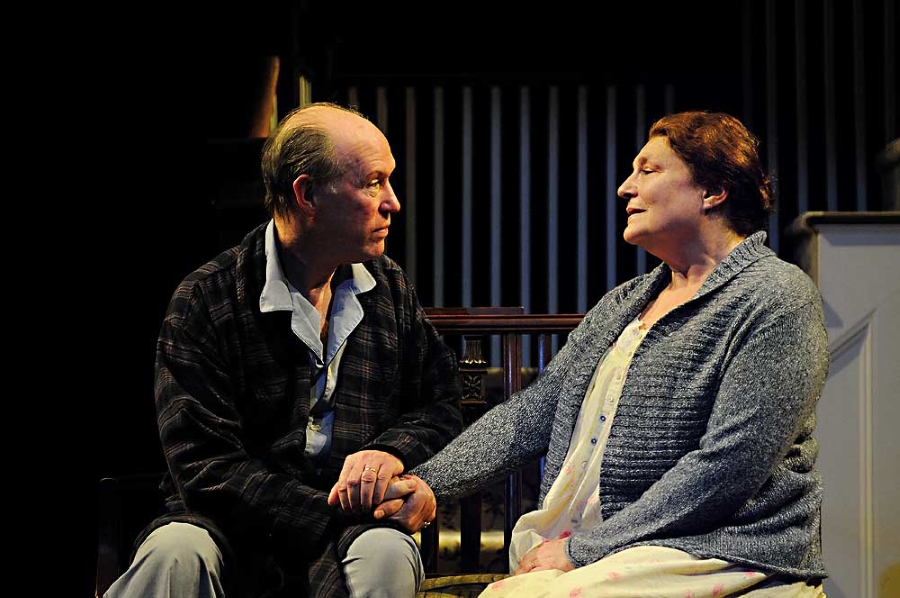In 1991, aspiring actor George Brant had just finished a BFA at Northwestern University, in the suburbs of Chicago. He moved into the city to audition. And audition. Then he thought, “Why don’t I just write a part for myself?”
The result was Lovely Letters, a satire of A.R. Gurney’s popular concoction Love Letters. The play called for just two podiums and three actors—Brant added a mailman—so it was immanently producible. Rents were low, and, by 1993, Brant was writing, directing and acting at his own theatre, Zeppo.

The son of a lawyer and a pianist, Brant, now 43, grew up in Park Ridge, Ill., seeing Sondheim musicals with his parents and casting family members in home performances of The Wizard of Oz. “He always had a bigger perspective—he saw the whole show, so it made sense he would be a director/writer/producer,” says actor J.P. Manoux, who co-authored two early plays with Brant, including Tights on a Wire, about rival circus families.
Brant’s plays for Zeppo were often satires of well-known stories, histories or other plays. In Night of the Mime, he parodied Old Yeller and other coming-of-age and death-of-a-pet stories. His BORGLUM! The Mount Rushmore Musical was a pseudo-biography of the South Dakota landmark’s sculptor.
Soon, Brant was exclusively performing offstage roles, replacing himself with actors he thought were better. Others began directing his plays, too. Derek Goldman, now artistic director of Georgetown University’s Davis Performing Arts Center in D.C., staged some of Brant’s early plays at his own 1990s Chicago theatre, StreetSigns. “Everyone around him found him to be the funniest person they knew, as a human being, a performer and a writer of brilliant and irreverent parodies,” Goldman declares.
No one could have guessed how dark a turn Brant’s stories would later take. “Mostly, I poked fun at theatre, and theatre has a hard enough time of it,” Brant decided. He challenged himself to make a statement of his own, without making fun of other people’s points of view. With The Royal Historian of Oz, for instance, he tried his hand at a sincere play about author L. Frank Baum, a play that “wore its heart on its sleeve.”
In the meantime, another artist was tackling Brant’s early work—Laura Kepley, a directing student two years behind him at Northwestern. Kepley met the “hilarious” play Tights on a Wire before she met its co-author Brant.
“She was a better director than I am,” acknowledges Brant. Over the course of the ’90s, Brant “moved from actor/director/writer to just being a writer,” he says. In 2001, he and Kepley married.
Success struck both of them, and juggling careers became a challenge. In 2002, Kepley was accepted to the Brown/Trinity MFA program in directing in Providence, R.I., while Brant got the green light to pursue an MFA in playwriting at the Michener Center for Writers at the University of Texas–Austin. Brant decided to put his own training on hold and moved to Rhode Island with his wife.

Fast forward to fall 2013: Grounded, Brant’s new one-woman play about the war in Afghanistan, is being produced all over the country and beyond. In the United Kingdom, the Gate Theatre opened the work this past August at the Edinburgh Festival, then moved it to the Gate’s space in London. Almost simultaneously, the National New Play Network—which gave the play its 2012 Smith Prize, a $5,000 commission—began rolling out the show, with productions at San Francisco Playhouse (through Sept. 7), Borderlands Theater in Tucson, Ariz. (Sept. 26–Oct. 13), and Unicorn Theatre in Kansas City, Mo. (coming up in January and February 2014). In 2014, productions of Grounded are also slated at Page 73 in New York City, City Theatre of Pittsburgh and American Blues Theater of Chicago. Oberon Books published the script in August.
In Grounded, an F-16 fighter pilot is reassigned to the Air Force’s drone program, shooting a remote-controlled Reaper in Afghanistan from a trailer near Las Vegas. She no longer risks being shot down, but now she can see the people she blows up. Before, she lived in another world. Now she goes home to her family at night. Is it really easier to pull the trigger from farther away? What does hiding classified information from those you love do to relationships? “Her struggle to compartmentalize her existence becomes more and more difficult as her two realities become increasingly permeable,” says Brant of the character he created.
Ideas surrounding Grounded started swirling when Brant learned President Obama had carried out more drone strikes in his first two years than President Bush had in his eight. Figuring that his own vote for Obama implicated him in this development, Brant wanted to explore the issue theatrically, but the play didn’t come together until he conceived of the pilot as a woman. He woke one day with three or four lines—“You are alone in the vastness, and you are the blue” was one—and the rest of the play followed. “You’ve got this magnet, and things start adhering to it over time,” Brant says, by way of explaining his process. He also did meticulous research about drones and women in the military.
Brant wrote Grounded during his fourth stay at WordBRIDGE Playwrights Lab (a city-hopping organization currently on hiatus), where he has served as a dramaturg as well as writer-in-residence. Actor Maggie Lacey, who did a reading of Grounded at the New Harmony Project in Indianapolis, said she loved creating the “messy, sexual, simultaneously happy and unhappy woman.”
“We have a lot of solo performances, but not a lot of true one-person plays,” suggests veteran Brant director Goldman, who has supervised two readings of Grounded. The play, he says, leaves audiences feeling they’ve met the protagonist’s husband, daughter, therapist and colleagues—characters who never appear. “The expansive dramatic canvas all comes through in this one voice,” Goldman adds. “Grounded is an endlessly rich play. For me, it’s arguably his richest to date.”
His Rhode Island interlude notwithstanding, Brant’s path to Grounded and to the national spotlight swerved south in 2005, when Brant headed for Texas—even though his wife, by then a resident director at Trinity Rep and the interim head of the MFA directing program at Brown/Trinity, still couldn’t join him. Brant says his decision to leave Providence grew from Kepley’s success at Brown/Trinity—she grew more confident and more accomplished because of her experiences there. “Seeing the change in her and her work convinced me that I needed to do something similar for myself,” he says. Suzan Zeder, who heads the UT programs in playwriting and directing and had actively pursued Brant for the school’s Michener writing program, greeted him at the airport, wearing a big cowboy hat.
Zeder says everyone benefited when Brant came into the program. He was not only one of the best playwrights to come through—“his work shows a depth of inquiry, craft and scholarship,” she says—he also helped mentor other writers outside of class.
Playwright Steven Dietz, who teaches at UT, noticed Brant’s “awareness of his place in the evolving artistic zeitgeist.” Austin is an experimental theatre town, Dietz points out. “George came into my office and said very seriously: ‘Dietz, I have a confession to make: I think I’m writing a realistic play.’ Of course, it turned out that George was actually writing an inventive, time-bending thriller with real people at its center—but I loved this ‘confession.’” Dietz notes that the work in question, Elephant’s Graveyard, turned out to be “a major American play.”
That work, which took Brant five years to realize, began when the writer was disturbed by a photo of an elephant who was hung in the small Tennessee town of Erwin in 1916. “The picture had an unreal quality and struck me in a primal way,” Brant recalls. But the conventional scenes he first attempted didn’t work. When he began to think of the play as a mix of a history, legend and fiction, “exploring the deep-seated American craving for spectacle, violence and revenge,” the dam broke.
“In this play, we don’t have the balm of a comic world to protect us from what is so disturbing,” says Goldman, who believes that with Elephant, Brant “started to claim his voice with some very singular things to say.”
The play’s poetic language also impressed WordBRIDGE director David White. “He paints pictures so beautifully on the page,” says White, who loves what you don’t see in Brant’s plays. “He’s not going to show you what it looked like to hang an elephant. He wants you to see your perfect elephant in your imagination.”
As it turned out, Erwin, Tenn., wasn’t far from Clemson University, where Brant was doing further development of Elephant at the WordBRIDGE lab. “One day, we drove there,” he recalls. “It was an out-of-body experience to be in the town you’ve been writing about for so long.” The visit gave him a chance to peel away things that didn’t fit and to make new discoveries. He found that the hanging had taken on mythical proportions, and people there argued over historical details. And, to Brant’s delight, he heard people in the town speak lines that were already in the play.
Kepley went to UT to direct the play’s world premiere, and it was a triumph, winning the David Mark Cohen National Playwriting Award from the Kennedy Center and the $90,000 Keene Prize for Literature at UT. (The latter was shared for the first time between finalists, a turn of events that Zeder says pleased the generous playwright, who felt it could otherwise foster a destructive competition between students.) Elephant’s Graveyard, which has since been produced in more than 100 venues, including colleges and high schools, will next be produced in February 2014 at Theatre Pro Rata in Minneapolis.
Among Brant’s 20-plus plays, often written for particular actors and ranging widely in style and subject, are many works based on historical events—Little Sir Echo tells the story of a German singer recruited by Joseph Goebbels to front a swing band designed to break the morale of the Allied Forces; Three Voyages of the Lobotomobile is about the inventor of the American lobotomy, and requires audience members to join the cast in performing operations on melons. Others are inspired by art—Dark Room, like Elephant, began with a look at photographs, in this case those of Francesca Woodman, who flourished in the ’70s before taking her own life at the age of 22. Alexander Platt, who plans to produce the play at Elemental Theatre Collective in Providence, describes Dark Room as a series of snapshots. “It’s like being in a gallery and going from picture to picture,” Platt says of the nine scenes, each independently structured but subtly linked together.
Still others have a psychological bent—Shop Talk is about a bored probation officer who finds a new way to use her power; Good on Paper concerns a police sketch artist in love with one of her drawings; in Ashes, a son is visited by the abusive spirit of his father; Any Other Name is about poetry, madness and identity theft in Victorian England; Baby Talk is about a couple who attempts to achieve perfection through a baby who may not be theirs; and the macabre The Cabin unearths a woman’s childhood secrets.

In 2010, when Kepley became associate artistic director of the Cleveland Play House, where she is now the acting artistic director, she and Brant moved to Ohio. Dobama Theatre, a few blocks from their new home in Cleveland Heights, immediately commissioned a Brant play—the theatre wanted anything he might care to write about Sarah Palin. Feeling “Saturday Night Live” had covered it all, Brant struggled before writing Grizzly Mama, a dark comedy about an assassination plan, which Kepley directed.
In short order, however, Brant would find himself spending time again in New England. The Mourners’ Bench, his “emotional puzzle play,” opened at Trinity Rep in 2012, with Michael Perlman at the helm. The play traverses time as three stories of traumatic events unravel, each involving a different set of people who lived in the same house.
Around that time, Brant also visited New Haven, Conn., for workshops with Theatre 4, which had commissioned a play for its three female co-founders. The result was Salvage, loosely inspired by Henry James’s The Aspern Papers. Co-founder Mariah Sage, who had appeared in one of Brant’s early comedies, says she was surprised by Salvage’s black humor.
The shift in tone in his more recent work, it turns out, surprises even Brant himself. “My plays are darker now. I don’t know why. I’m happy,” he reflects.
But perhaps, as some of his colleagues suggest, Brant’s latest plays are not altogether gloomy. “His plays reveal something both creepy and hopeful,” Platt suggests. Recalling the humor in Grounded, Kepley reports that “around the time George turned 30, his work got more dangerous, but he still finds this incredible heart in places you wouldn’t expect.”
Perlman makes a similar point: “In The Mourners’ Bench, every character in every scene is looking for love,” the director observes. “This is a writer who holds the dark and the light side by side.”
Writer Davi Napoleon lives in Michigan.


